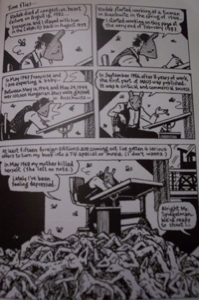October 08, 2004
 Arrested Development
Arrested Development
by peterbI was at the Carnegie Library last night, trying to track down volume 2 of Alan Moore's Promethea. A very nice librarian was helping me, and we got to talking, and she said "So, are you really into..." There was a long pause. "...graphic novels?"
Now, I'm sure she was just making conversation, but there was a very large part of me that was sure that the real question being asked was "Why are you reading comic books? Aren't you past that yet?"
I'm sensitive about this, in part, because of something someone said to me not too long ago. They were saying that they read my writing and thought it surprising that a guy in his thirties "still played videogames." I laughed it off, but inside I was stunned. It had never occurred to me, even for a moment, to entertain the idea that playing videogames was something that one would set aside with adulthood, like playing with dolls or making mudcakes.
There are lots of games that are for kids, sure. There are lots of movies for kids, too. I'm imagining someone asking Martin Scorsese when he will be graduating to actually writing something substantial, like a book, now that he's exhausted the infantile palette available to him in film. Or dismissing books as a medium, because, y'know, Charlotte's Web was for kids.
I could stand around coming up with counterexamples of videogames (or, for that matter, graphic novels) that are clearly written by adults and for adults, but that is a tired argument, and not very interesting. It's fascinating to me how pervasive the meme is, the idea that an entire medium is unworthy of serious consideration, regardless of the message it carries.
My suspicion is that in large part this comes down to marketing and money. The entire graphic novel channel is geared towards delivering cheaply printed, mass-produced content at high profit margins to kids (and the Comic Book Guy from the Simpsons). That's who has traditionally spent the money on comic books. That's changing, but very slowly. Videogames have changed more quickly, largely because those of us who grew up with them won't accept anything less. You can still see the fault lines, though: would anyone walk up to a 66 year old retiree in a Vegas casino and tell them that the videogame slot machine they're playing is "for kids"?
It is, in the end, all a matter of perception. Go to any chain bookstore and you'll find a "Science Fiction/Fantasy" section full of crappy writing with half-naked barbarian women in chainmail lingerie on the covers of their books. You'll also find some superb writers and wordsmiths, such as Gene Wolfe or Terry Pratchett ("Who writes amazing sentences," says A.S. Byatt, whose own Babel Tower includes a story-within-the-story that would be right at home on the chainmail bra shelf, as would the similar story in Margaret Atwood's Booker prize-winning novelThe Blind Assassin). Meanwhile, the best science fiction story of the 20th century is probably Salman Rushdie's Midnight's Children. You'll find that on a different shelf, because some over-privileged Yale prat only gets paid if he decides that some works are Literature, and other works merely Genre.
This serves the interests of consumers, but not, necessarily, the interests of readers.
I'm in my thirties. I read books. Some of them have pictures. Some of them don't. I watch movies. I watch TV. I play video games. I write, and publish what I write, without necessarily expecting money in return.
Welcome to the new adulthood. See you on Xbox Live.
Posted by peterb at October 8, 2004 12:14 AM | Bookmark ThisIt's funny you mention Atwood. Her novel, The Handmaid's Tale was some of the most cliched SF I ever read, and yet was hailed as this great serious book. What a bunch of crap.
Posted by psu at October 8, 2004 07:02 AMWhat I find depressing is that the "that's something for kids, right" attitude sometimes extends to reading of plain text books.
To Pete's comment: this is a general problem with genre cross-overs, and Atwood's book wasn't sold into the sci-fi market. There is actually some decent work in the romance market, but people who write romance plots in sci-fi (or, more usually these days, fantasy) don't read romance novels ("ewwww!"), so they write hackneyed nonsense. Fortunately sci-fi/fantasy readers don't generally read romance novels either, so they don't feel their intelligence is being insulted.
Posted by Faisal N. Jawdat at October 8, 2004 08:47 AMI thought she was coming on to you.
Posted by Homer the Poet at October 15, 2004 10:01 PMPlease help support Tea Leaves by visiting our sponsors.
